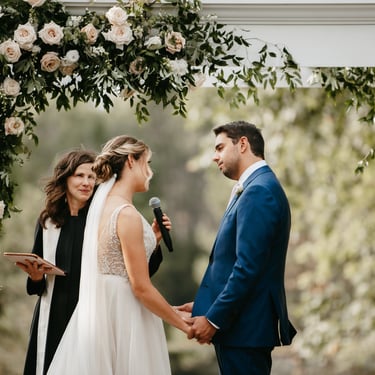
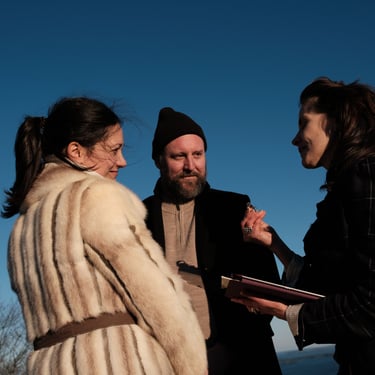
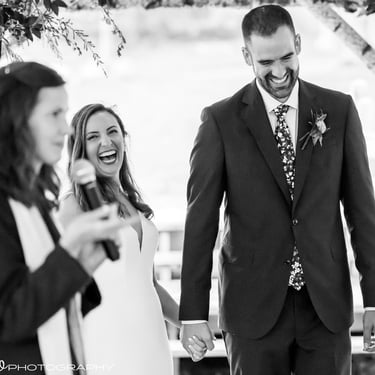
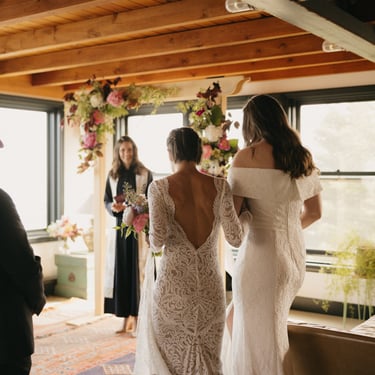
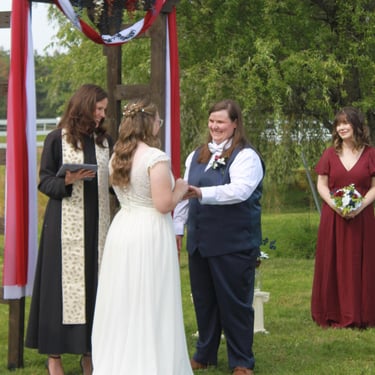
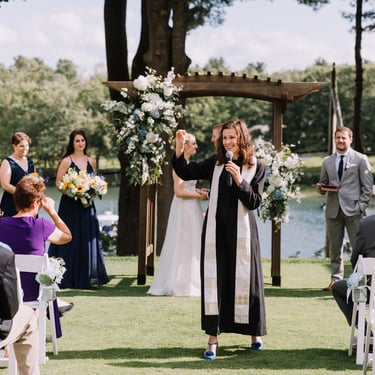
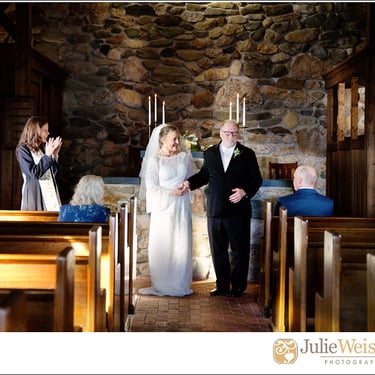
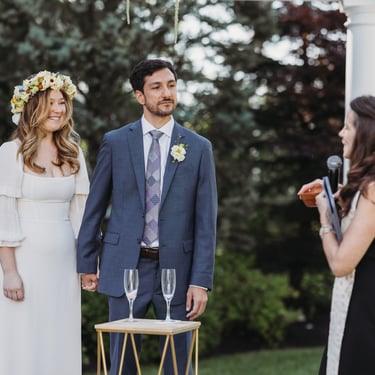
If you've got Qs, I've got As!
Why should a UU minister be our officiant instead of a friend or "internet minister"?
If you have to ask, you don't watch wedding-based reality shows. (Of course I watch: it's research!) Every show seems to include a Very Awkward Officiant whose verbal stumbling or hair-raising theology detracts from the couple exchanging their vows.
Your wedding is a singular event: a gathering of your loved ones that might never happen again. As a minister, I call those circumstances sacred: a time set apart from the ordinary.
Whether you want a God-centered ceremony or a secular one, the officiant's role is to set the tone and hold the space . While you may adore a friend or relative enough to call them into service, that person may struggle to hold the tender, profound energy of your wedding without inserting themselves into it. You and your guests are worthy of a ceremony without anxiety, awkward attempts at humor, or other risks that arise when well-intentioned but inexperienced friends step into an officiant role. Let your friends enjoy the day, or ask them to fulfill a different leadership role.
What do you mean by "hair-raising theology"?
Words matter; beliefs have consequences. Since a lot of engaged couples don't know what they don't know (why would you?), some couples find themselves at the altar hearing unexpected and unsettling statements. A common trend, in straight weddings, has to do with the wife "serving" her husband, or the groom "leading" his wife. (If you were troubled by reading that sentence, you're my kind of couple.) Those values are tethered—directly or indirectly—to problematic dogma. As your officiant, I clarify your core values and weave them into your ceremony.
Where do you work?
I live in Bath (Maine), but travel far & wide.
How long is the ceremony?
Most of my weddings last about 25 minutes—a concentrated, powerful time, like fruit cooked down to its essence. The personalized ceremony will feel like an authentic reflection of you and your relationship.
Do we have to say "God"?
Only if you want to. Many of my ceremonies are secular or "spiritual but not religious." My job isn't to force religion on you; it's to create a tone of reverence and celebration using language that feels right to you.
Can we write our own vows?
Of course! Your own words to each other are far more meaningful and binding than anything I could suggest for you. If you’re not sure about writing your own vows, I supply you with a range of options—from traditional to modern—to inspire you.
How do you dress for the ceremony?
I usually wear a black clergy robe and stole. (Like any fashion-forward minister, my stoles come in a range of colors. Tim Gunn would approve.) I cheerfully honor requests to leave my stole and robe at home.
Can we have a chuppah? A handfasting? Broom jumping?
The sky's the limit... figuratively (I'd prefer not to officiate at a sky-diving wedding). We can incorporate any ritual or element that resonates with you... and I have many creative suggestions.
Is there anything you won't do?
I'm not the officiant for you if you need to refer to marriage as belonging exclusively between a man and a woman, or if your vows include "obey." These choices don't reflect my understanding of marriage as a freely chosen commitment between equal partners.
I won't surprise you. If you choose me as your wedding officiant, you'll understand my process and my fees upfront, and will know what to expect. During the ceremony, I'll say words that you and I have agreed are appropriate for your wedding.
Finally, while laughter is part of most wedding ceremonies, I'll never make jokes that prey on gender stereotypes or denigrate marriage. It makes me cringe when a couple's brave and joyful choice to marry one another is marred by cheap humor.
Do we need a rehearsal?
I think you'll be grateful for it. Rehearsals aren't just about building "muscle memory" for the processional; they're an opportunity for couples and their families to absorb the emotional ooomph of the marriage that's about to occur, and for us to connect as a team.
We're pregnant/trying to get pregnant before the wedding. Does that bother you?
Only if you don't send me baby pictures.
I'm booked for these 2026 dates:
May 23 (Erica + Kian)
June 20 (Lilly + Connor)
July 11 (Kate + Austin)
July 24 (Lauren + Bryan)
*note: If your July 25th wedding is in or near Bar Harbor, I'm waiving mileage fees for that date!

